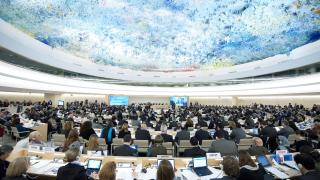
Kicking off its latest session, the new UN High Commissioner for Human Rights, Prince Zeid of Jordan, gave his inaugural address to the UN Human Rights Council. Paying tribute to his predecessor, Navi Pillay, he said:
That she could annoy many Governments – and she did – was clear; but she believed deeply and movingly in the centrality of victims, and of those who are discriminated against. They needed her vocal chords, her lungs and her pen, and she made everyone listen. I pledge to continue along the same path: to be as firm, yet always fair; critical of states when necessary, and full of praise when they deserve it.
Prince Zeid used his speech to give an overview of current situations of concern from around the world, focussing particularly on Syria, Iraq and Gaza. He also spoke about the need for human rights to underpin the Sustainable Development Goals currently being negotiated at the UN.
The session was a productive one with over 30 resolutions adopted. Altogether 112 resolutions have been passed in 2014, the highest number in the Council's eight-year history. Hightlights from the session can be found below.
Country-specific
Yemen
Recognising the current instability in Yemen, which has been ongoing since the 'Arab Spring' protests in 2011, the Council passed a resolution calling for the Office of the High Commissioner for Human Rights to provide the country with technical assistance in fulfilling its human rights obligations.
Syria
The Council adopted its 15th resolution condemning the situation in Syria and held an interactive dialogue with its Commission of Inquiry on the crisis. As the death toll from the conflict approaches 200,000, Mr Paulo Sérgio Pinheiro, Chair of the Inquiry, told the Council "I have run out of words to depict the gravity of the crimes committed inside Syria".
Ukraine
In response to a UN human rights monitoring mission in eastern Ukraine, the Council held an interactive dialogue with Ivan Simonovic, Assistant Secretary-General for Human Rights to consider its report. The UK, along with the EU, Hungary and Ireland, lead calls for accountability for all human rights violations occurring during the initial pro-democracy protests and since.
Thematic
LGBTI rights
The Council passed a resolution expressing grave concern over the acts of violence and discrimination facing lesbian, gay, bisexual, transgender and intersex (LGBTI) people around the world. The resolution called for the High Commissioner to share examples of good practice in applying existing international law to protect LGBTI rights. Passed by 25 votes in favour, 14 against and 7 abstentions, this issue is a polarising one for the Council.
Armed drones
A panel of experts including Ben Emmerson QC, Special Rapporteur on human rights and counter-terrorism measures, discussed the legal ambiguities around the use of armed drones. France, Germany, the UK and the US objected to the discussion as outside the Council's mandate. Click here for full details.
Protection of journalists
Adopted by concensus, a resolution on the protection of journalists called for states to implement strategies for tackling violence against them. The Council has previously identified measures that could be undertaken by member states, such as removing censorship laws which are often used to coerce and intimidate the media.






